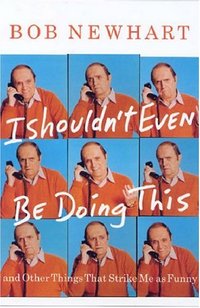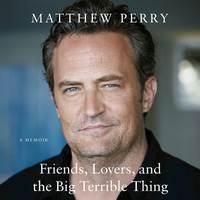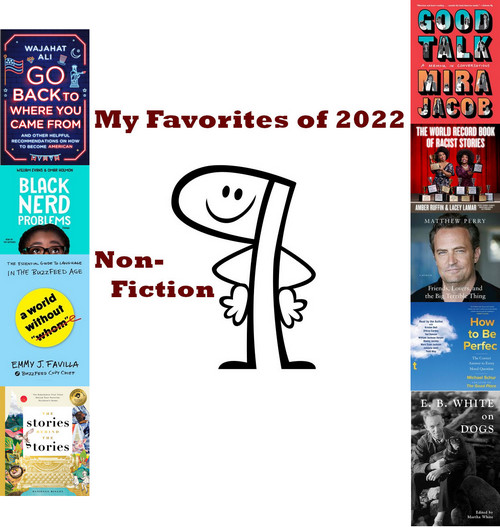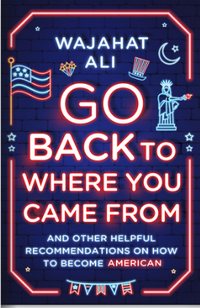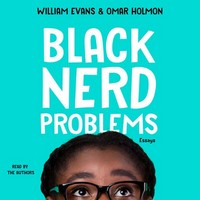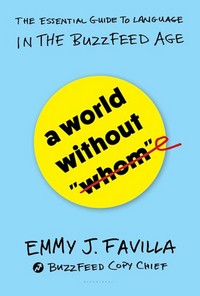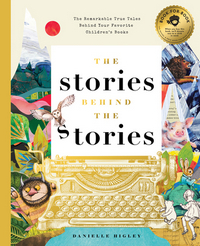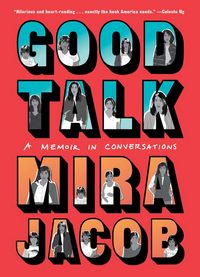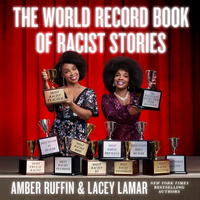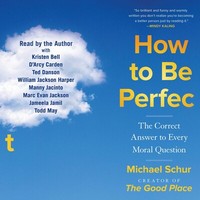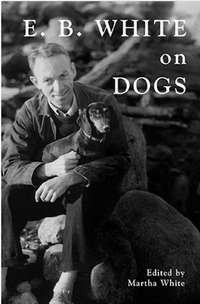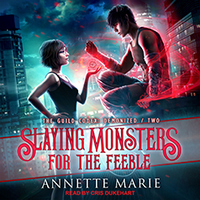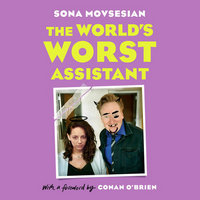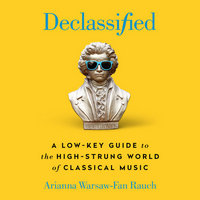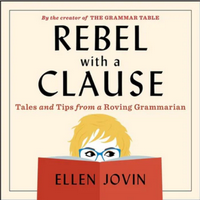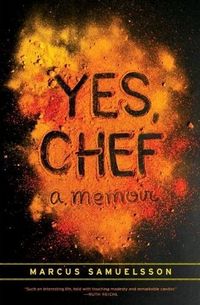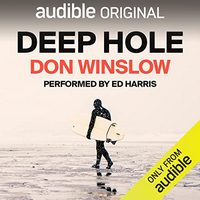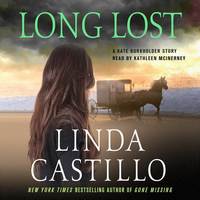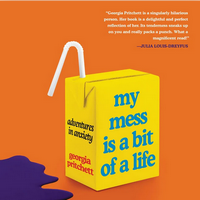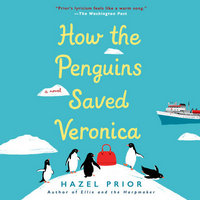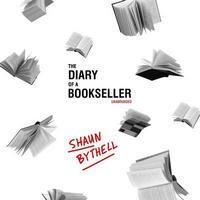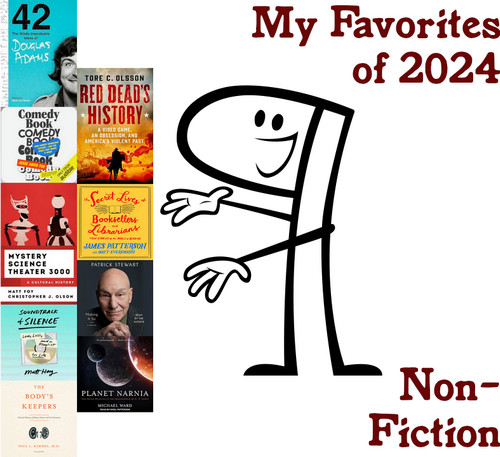
My 2024 Wrap-up continues and now we’re on to the Non-Fiction list. While I liked a number of works that didn’t make this list, I felt strange calling them a “favorite.” So, we have 9 instead of the nigh-obligatory 10. These are the ones that stuck with me through the year; the ones I cited in conversation; that I thought about when reading something else or watching something on TV. Yeah, there’s some overlap between this list and the audiobook list from yesterday—lately, most Non-Fiction books I work through are in audiobook format. So it makes sense, even if it makes this post seem like an echo.
As always, I only put books that I’ve read for the first time on this list. I don’t typically return to NF books (outside of looking up things for one or three points), but occasionally I do—for example, The Pleasures of Reading in an Age of Distraction by Alan Jacobs would get a permanent spot on this list, were it not for this rule.
(in alphabetical order by author)
 42: The Wildly Improbable Ideas of Douglas Adams
42: The Wildly Improbable Ideas of Douglas Adams
edited by Kevin Jon Davies
My original post
This collection of material from the 60 boxes of personal artefacts, compiled by a longtime collaborator is moving (which I didn’t expect), funny (duh), strange (more duh), and fascinating (of course). I found this to be mind-bogglingly delightful. Which is pretty much what I expected, true. But there’s expecting to appreciate a book and then getting to experience it and discover that you were right. It’s is kind of a doubling of pleasure.
If you’re a fan of Adams, you’re going to find at least one thing here that will interest you more than you anticipated. If you’re a big fan of Adams, you’re in for a treat. He was the hoopiest of hoopy froods, and this book gives you a glimpse into just how hoopy that is.

 Comedy Book: How Comedy Conquered Culture–and the Magic That Makes It Work
Comedy Book: How Comedy Conquered Culture–and the Magic That Makes It Work
I ended this book thinking if Fox doesn’t know something about stand-up comedy, it’s probably not worth knowing. That doesn’t mean I agree with all of his opinions about it, but, wow. It’s like listening to an encyclopedia of stand-up. He talks history, he talks current stars, political humor (and the role of comedic news programs), lowbrow, how minority comics can help their communities–and how those communities can make new comics, he talks about some big names, some big names that fell apart, cancel culture (and how long that’s been a thing. Hint: ages.). He runs the gamut with insight, wit, and some third thing that I can’t think of at the moment, but is impressive.

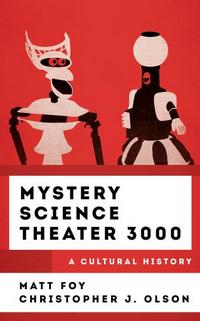 Mystery Science Theater 3000: A Cultural History
Mystery Science Theater 3000: A Cultural History
by Matt Foy and Christopher J. Olson
My original post
This is the second year in a row that I’ve had a book about MST3K in my favorites. This is the more academic version of the book I featured last year, essentially. It’s geared more toward media studies and the impact the show has had on culture–media culture, in particular, as well as Internet commentary–as it was/is shaped by it.
I felt smarter after reading this, appreciated the show in a new angle or two, and was driven to watch an episode or three. (sure, it’s not a perfect book, it gave me an allergy to the term “intertextuality” for a couple of months)

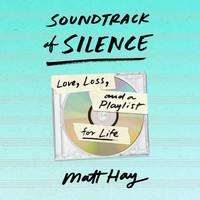 Soundtrack of Silence: Love, Loss, and a Playlist for Life
Soundtrack of Silence: Love, Loss, and a Playlist for Life
by Matt Hay
WOW, this was fascinating. Both the way he talked about music, referenced music, did his best to pound certain songs and sounds into his brain so that when we went deaf, he’d be able to play them in his brain–such a great idea, you couldn’t help but get inspired by that.
And then when he describes the medical treatments, the agonzing process of ups and downs he went through to work on the tumor/side effects? It got even better–and I couldn’t stop talking about it. Hay describing this in his own voice adds so much to it all.
I’m so, so, so glad I listened to this one. (I don’t remember why I only gave it 3 1/2 Stars, I won’t argue with past me, but present me would rate it higher. Maybe you have to sit with it for awhile.)

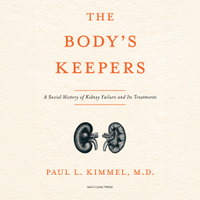 The Body’s Keepers: A Social History of Kidney Failure and Its Treatments
The Body’s Keepers: A Social History of Kidney Failure and Its Treatments
by Paul L. Kimmel, M.D., read by Lane Hakel
My original post
I have been learning about Kidney Disease, Transplants, Dialysis as an interested observer since my 20 year-old-son was 3 days old. But listening to this book made me feel like I’d never heard of any of it those things before. Granted, Kimmel focuses on other types of Kidney Disease (seemingly every other kind than he had), but still, a lot of what he wrote applies.
Just hearing about the early work on what we now call dialysis made this book worth it. (looking at a dialysis machine in 2024 and thinking about those passages is a little freaky). But then again, so is almost every chapter.
I have referenced this book in my own thoughts, conversations with family, friends, and coworkers so many times since I listened to it that I feel like I owe the author/narrator some royalties, and if I don’t move on to the next book on this list, I’m going to end up writing another 8 paragraphs on this book.

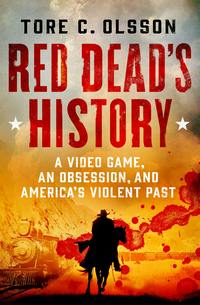 Red Dead’s History: A Video Game, an Obsession, and America’s Violent Past
Red Dead’s History: A Video Game, an Obsession, and America’s Violent Past
My original post
Fantastic idea for a class. Fantastic idea for a book. Taking a look at the historical setting and historical accuracy of a game that had the reputation of realism is so smart. It’s not a critique (generally), it’s an exploration of all the things that are shown, giving the background, showing all the things it got right (and would’ve got righter if they’d changed the year). Showing the ways that the real history was even worse–and occasionally better–than the game depicts.
It does so in an engaging way, too. American History buffs and/or video game aficionados should give this a read. Or people who get the appeal of either, but don’t have the energy for them (like me).

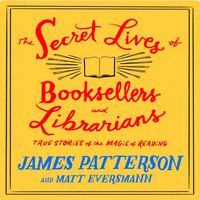 The Secret Lives of Booksellers and Librarians:
The Secret Lives of Booksellers and Librarians:
Their Stories Are Better Than the Bestsellers
by James Patterson and Matt Eversmann; Read by: Tom Force, Nancy Peterson, Jenn Lee, Jennifer Pickens, Amy Jensen, Deanna Anthony, Jane Oppenheimer, Susan Hanfield, Marni Penning, Daniel Henning, Rob Reider
My original post
Is this an overly-romanticized look at bookselling/being a librarian? Yes. Do I care? Not one whit.
This is an inspiring and entertaining look at the people who connect others with the books they want or need—whether they realize they want or need them or not. For a booklover, this is great to hear. They sound like what you want them to sound like.
The big problem with this book is that you’re going to fight the impulse to quit your job and go get your MLS or start working as a clerk in a bookstore as soon as you finish (or by the mid-point). As downsides go, it’s a pretty tame one, but it’s there.

My original post
I think I said it all yesterday (oops, should’ve left a little something) or in my original post. So, I’ll just repeat myself.
First off, any audiobook narrated by Patrick Stewart is worth your time. And then some. That’s a given, right?
When it’s him recounting events from his life–especially when he makes it clear that he was in the wrong, or foolish, or less-than-ideal in some way? It makes it even better.
I was captivated, I hung on to every word (as much as I could while working/driving). I annoyed my family (only some of who are fans of some of his work, the others don’t really care one way or the other) by retelling the stories. Oddly, none of them found them as entertaining as I did. Not that it stopped me…
If you’re a fan of any one of Stewart’s roles, it’s worth the listen just to hear him talk about that role. If you like multiple roles, you’ll have even more fun. If you listen to the whole thing, you’ll be a fan of the man, not just the actor.

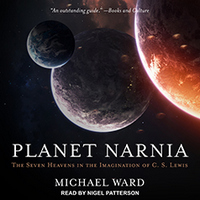 Planet Narnia: The Seven Heavens in the Imagination of C. S. Lewis
Planet Narnia: The Seven Heavens in the Imagination of C. S. Lewis
by Michael Ward, read by Nigel Patterson
I honestly don’t know if a week has gone by since last January that I haven’t thought about this book (probably, but not many). One of my reading goals for the year is due to it (more on that soon). I don’t know that I accept Ward’s thesis (which I won’t restate here, go click on the links above). I do know that I can’t discount it. I also know I’m not smart enough to go further than that, I also don’t know Lewis well enough to argue one way or the other.
I discovered new depths to the beloved series here, regardless of what I think of Ward’s argument. It inspired me to think about this series more. I also clearly need to re-read the first two-thirds of his Space Trilogy (and to actually read the last third) as well as some of Lewis’ other work.
It’s dense. It’s thorough (at least it seems to be). It’s provocative. It’s absolutely worth your time, and I probably should’ve given it more stars just because of the space it’s taken in my brain since.

![]()


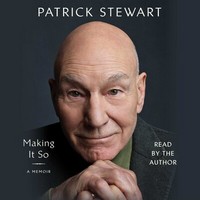
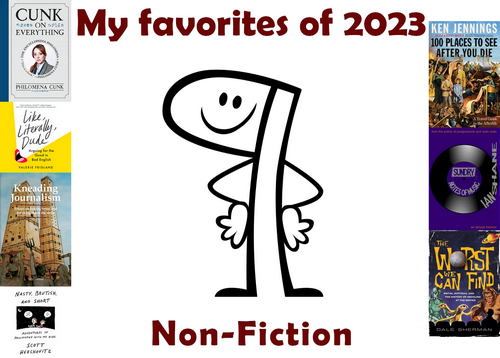
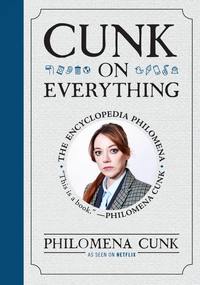
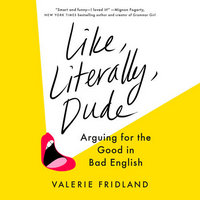
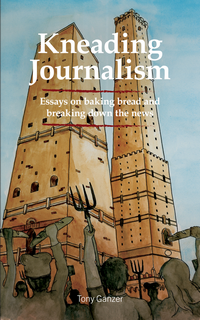
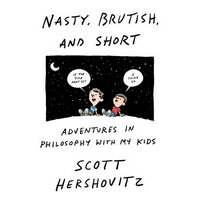
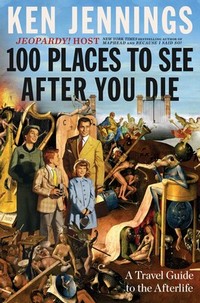
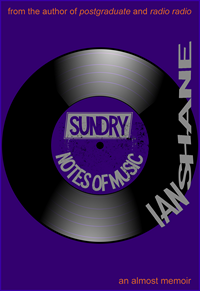
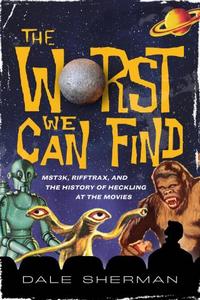



 Grab a book, any book.
Grab a book, any book.